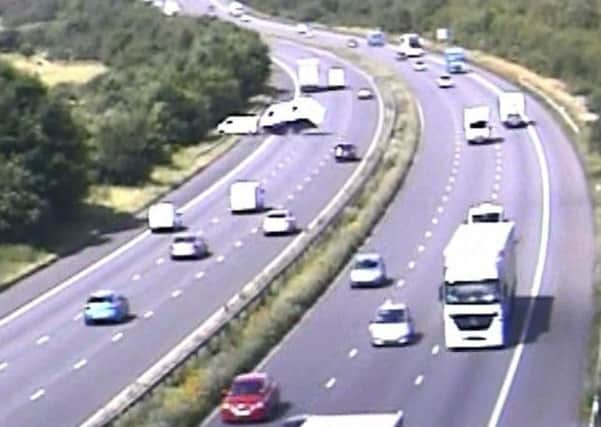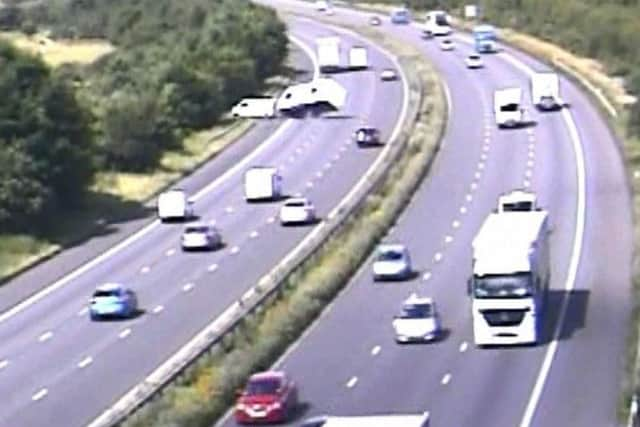VIDEO: CCTV clip shows the importance of being prepared for towing


New CCTV footage shows the potential dangers of towing as the Highways Agency urges drivers to prepare caravans and trailers this Easter.
Highways Agency Service Delivery Manager Andy Withington said: “Spring and summer are the peak seasons for towing-related incidents on our roads. Over Easter many people will be hitching up their caravans and trailers for the first time since autumn, so we’re asking them to take time to ensure they’re fit to tow before going on the road.
Advertisement
Hide AdAdvertisement
Hide Ad“Incidents involving towed vehicles can cause long delays for other road users as well as distress for anyone directly involved.


“Although high speed incidents involving towing can be serious, the majority of problems we see on our roads are breakdowns – which can be avoided with routine checks and maintenance.”
The causes of towing incidents include overloading the caravan or trailer, a mismatch with the towing vehicle, tyres which have burst because they have not been checked or replaced where needed and poor towing technique. The Highways Agency advises anyone towing a caravan or trailer to:
carry out a final maintenance check before setting off – particularly if it has been left over the winter
Advertisement
Hide AdAdvertisement
Hide Adpay particular attention to the condition and pressure of the tyres on both the towed and towing vehicle
check that loads in the towed and towing vehicle are secure, that the weight is evenly distributed and is not excessive
be aware of how towing affects the vehicle’s performance – particularly braking distances
use extended mirrors when towing wider trailers, such as caravans, to ensure clear and legal visibility of the trailer and of other vehicles on the road
Advertisement
Hide AdAdvertisement
Hide Adcheck they have an appropriate driving licence for the vehicle and trailer combination
know the correct speed limit for the vehicle and roads
make sure they have proper breakdown cover in place
Drivers towing boats in particular should take care to keep the hubs of their trailers out of cold water, as this can stop the grease working and lead to failed bearings.
The Agency works closely with the Caravan Club, the Camping and Caravanning Club and the British Horse Society to promote safety messages to people who tow vehicles and trailers.
Martin Spencer and Ian Hewlett from The Caravan Club and The Camping and Caravanning Club said: “Fit to Tow gives road users basic towing advice on issues like driving licence limits and judging vehicle and trailer capabilities, ensuring you’re safe for and on the road.
Advertisement
Hide AdAdvertisement
Hide Ad“It’s important and a legal requirement that all trailers including caravans, trailer tents, folding campers and basic trailers are roadworthy. Schemes like the Approved Workshop Scheme (www.approvedworkshops.co.uk) help achieve this.
“Add simple user checks on items like tyres and couplings, plus awareness of what causes instability, and towing a trailer should always be safe and enjoyable. Make sure you have an appropriate towing vehicle, have a correctly loaded caravan or trailer and keep to sensible speeds (especially downhill), and the instability shown in the video is effectively impossible.”
For more help, contact either of the organisations for advice. See www.caravanclub.co.uk and www.campingandcaravanningclub.co.uk.
Sheila Hardy from the British Horse Society said: “We all want to transport ourselves and our animals safely. Breaking down – or worse – on a busy road is stressful for both drivers and horses, so we should do all we can to avoid finding ourselves in that situation.
Advertisement
Hide AdAdvertisement
Hide Ad“We encourage everyone to follow the Highways Agency’s advice and go to www.bhs.org.uk for more specialist information.”
Congestion on the strategic road network is estimated to cost the economy £3 billion each year, 25% of which is caused by incidents. In 2013, there were 5,480 incidents involving caravans and trailers on the Highways Agency’s network of motorways and major A-roads. Over 4,000 of these – almost 75% of such incidents – happened between April and September. During autumn and winter, 1.4% of all incidents involve caravans and trailers. During spring and summer – this increases to 2.6% of all incidents.
The Agency encourages all drivers to plan their journeys and provides a full range of services to help with this.